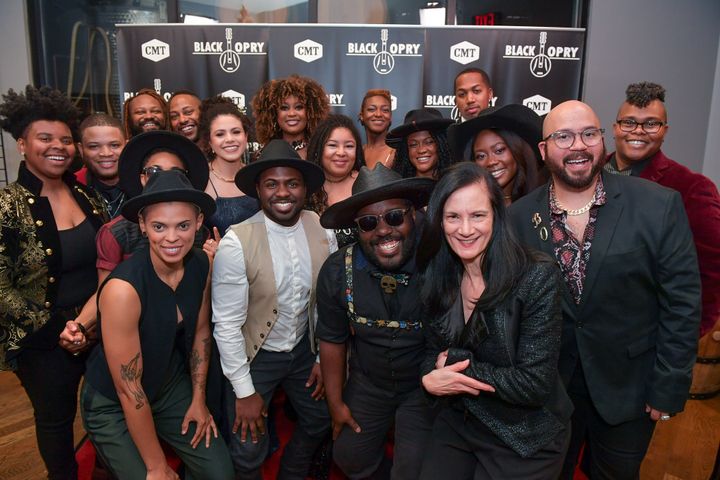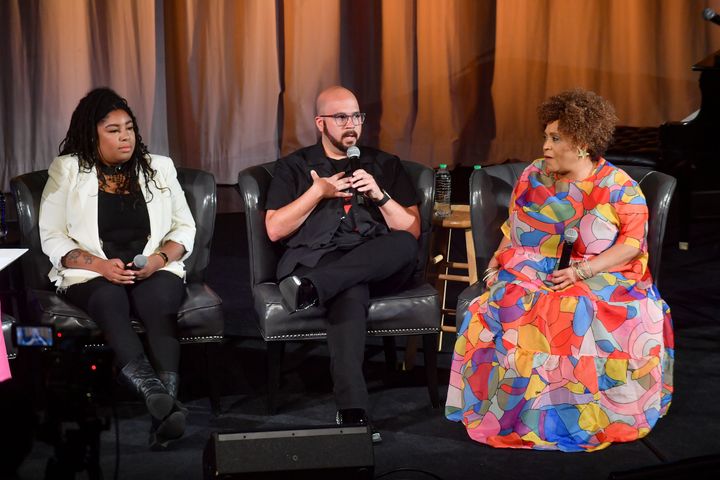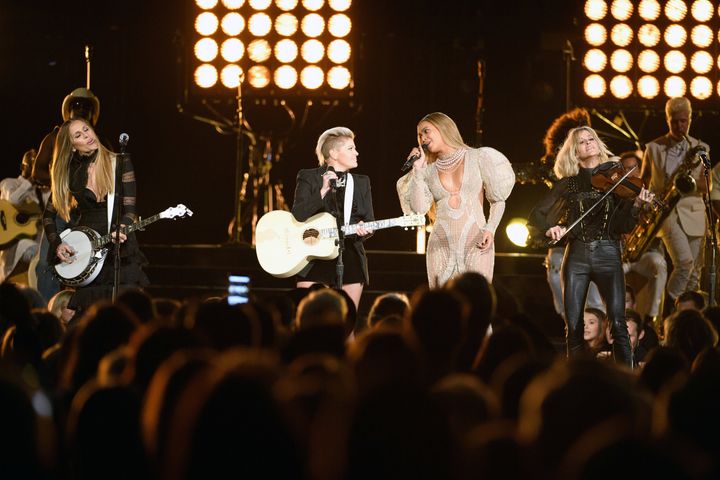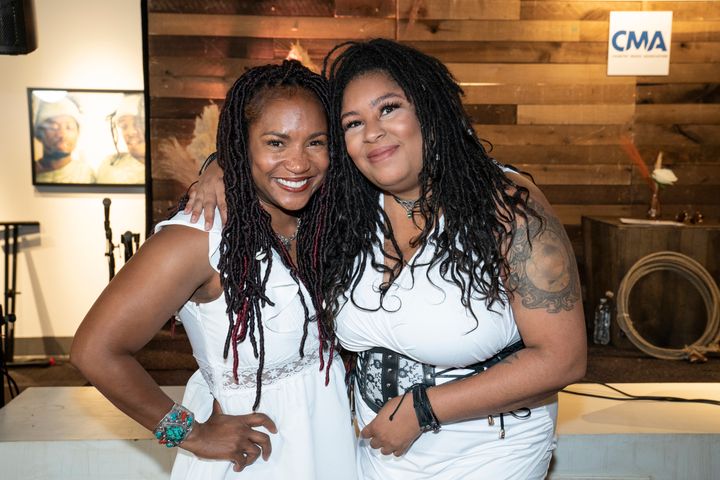
Since mid-February, Holly G’s email inbox has been filling up with at least half a dozen press requests a day.
At the time, Beyoncé had just announced that she’d be releasing a country album. Immediately after, Holly started an educational series on X, formerly known as Twitter, spotlighting a new Black country artist every day. Her desire to spread awareness about Black country musicians and their history is just the tip of the iceberg in terms of her impact on the country industry.
Enter Black Opry, led by Holly G and co-director Tanner Davenport, which serves as a support system and resource for Black country music fans, industry professionals and artists, such as the Kentucky Gentlemen, Roberta Lee, Julie Williams and others.
“Country and roots music have been made and loved by Black people since their conception,” the Black Opry site reads. “For just as long, we have been overlooked and disregarded in the genre. Black Opry is changing that.”
Launched in April 2021 as a blog with just over 3,000 followers, Black Opry has since grown into “a home for Black artists and Black fans of country, blues, folk and Americana.” Its X account boasts an audience of over 15,000, and the group brings Black talent to stages all over the country.
In addition to community, the site offers playlists and musician profiles for audiences to discover their new favorite artists. Black Opry challenges the idea that Black artists and fans should simply be grateful to be on the country music scene at all ― especially in a genre our forefathers created.
“If we want something that’s gonna be equitable and long-lasting, I think we build our own shit,” said Holly, 34, who is Black Opry’s founder. “We want to have an ecosystem that exists outside of the mainstream that supports these artists.”
On Super Bowl Sunday, Beyoncé successfully broke the internet with just a few words in a Verizon commercial: “OK, they ready. Drop the new music!” Five months after a record-breaking world tour, the Houston native released the first two singles from her album “Cowboy Carter.” Later in February, she made history as the first Black woman to top Billboard’s country charts.
Beyoncé’s foray into country music has ignited a discourse about race and the seemingly lily-white genre. So many questions have bubbled up in the last six weeks: Who gets to be considered “country,” and why? Can the genre, or the American flag associated with it, be “reclaimed”? How did whiteness obfuscate the very Black, very layered origins of country music? Why did it take so long for a Black woman to claim that No. 1 spot?
Beyoncé is using her global superstardom and agency to redefine and rectify a bad experience, one all too familiar for Black artists in country music. In “American Requiem,” the first track on “Cowboy Carter,” she sings: “They used to say I spoke ‘too country’ / Then the rejection came, said I wasn’t ‘country enough.’”
Having donned cowboy hats in the early 2000s and been ridiculed by TV personalities for her Southern accent, Beyoncé is undeniably country at her core — but she shouldn’t be tasked with “fixing” an entire genre, or credited for doing so. The systemic factors that other Black country artists and industry professionals have had to contend with will still exist. But the Black Opry has been trying to fix that.
The reality is that the gatekeepers, aka the centralized authority and voting body that is the Country Music Association, dictate what and who are considered “country enough,” and that’s just one of the many factors limiting the success of Black talent. Moreover, country radio has an intense stronghold in the industry, serving as “the No. 1 source of discovery in country music,” according to Rolling Stone.

The Black Opry understands that rather than negotiating for a seat at the table within institutions designed to keep country music white, it’s time to build another table altogether. A similar mentality appears to be the impetus for Beyoncé’s “Cowboy Carter.”
In an Instagram post announcing the 10-day countdown to the album, Beyoncé wrote: “My hope is that years from now, the mention of an artist’s race, as it relates to releasing genres of music, will be irrelevant.”
The question is not whether Beyoncé cares to be embraced by the country music establishment, or its fans. As she wrote on Instagram, “This ain’t a Country album. This is a ‘Beyoncé’ album” ― one born out of her desire to “propel past limitations” and transcend genre. The real question is what lies ahead for Black country artists after Beyoncé moves on. (“Cowboy Carter” is the middle installment of a trilogy that began with 2022’s dance record “Renaissance”; fans are already speculating that Act III will be a rock album.)
Beyoncé’s Instagram post also mentioned not feeling welcomed in the country space, likely alluding to her performance of “Daddy Lessons” at the 50th annual CMA Awards in 2016, after which she was the target of hostility from white country fans, conservatives and the industry at large. Online discourse intensified after CMA appeared to scrub all mention of the performance off its platforms. (Following the backlash, CMA denied erasing any mentions of the performance. In a statement to HuffPost, CMA said that it removed an “unapproved” five-second promotional clip prior to the broadcast.)
Davenport, the Black Opry co-director, has been a member of the Beyhive since 2003. He attended that CMA Awards show as a college student. Earlier that day, he’d been tipped off that Beyoncé might be performing, so he ran down to the box office of the Bridgestone Arena in Nashville, Tennessee, and purchased tickets.

“For your favorite artist of all time to come out and perform in the genre that you’ve always loved as a kid, I was overwhelmed,” Davenport said. “It felt, to me, like a celebration, but within a matter of minutes, that moment reversed itself. To everyone else around me, it felt like they were in danger or something.”
It made sense to Davenport why the Chicks and Beyoncé — Southern women from Texas — were on stage. But it was also clear that white Americans perceived it as an affront to their identity.
“They felt like something that they cherish so much was being taken away from them,” Davenport said. “I vividly remember when I was down there, I was surrounded by majority-white people. I will never forget there being a woman in front of me saying ‘That Black bitch needs to get off stage,’ and me being shocked that that even came out of her mouth.”
Holly said it was a daring decision for CMA to bring “three liberal” Chicks back to country music’s main stage (after they were blacklisted for criticizing then-President George W. Bush). But it’s a testament to Beyoncé leveraging her power to buck industry standards.
Still, if Beyoncé could feel that kind of hostility at the 2016 CMA Awards, what about Black country artists with far less visibility, influence or money?
That’s where Holly and Davenport’s organization has been doing the work. Holly knows all too well what kind of racism and hostility can be found in the country music space. She is a queer Black woman from Virginia, and she has always been drawn to country music.
Like many Black country fans, Holly silently endured concert experiences filled with microaggressions, such as stares from other attendees, Confederate flags flying at various venues, white fans trying to test her country music acumen and other slights. As anti-Black police brutality spurred a “racial reckoning” in summer 2020, Holly witnessed some country musicians begin to pick sides.
“To see all of the people whose music I loved and respected for so long either be silent, or speak against my dignity and humanity as a person, made me feel like I had to figure out a different way to consume country music, or I had to leave it alone,” Holly said.

Lately, she and her work with Black Opry have gotten a lot of welcome attention, but she says it’s also been emotionally and mentally taxing to try and discern which parties, especially among the power brokers, are genuine in their interest.
“For my mental health, I had to get off social media completely,” Holly said, acknowledging her inconsistency in posting about Black country artists. “I don’t want anybody for a second to think that we’re not grateful for the opportunity to get not only our story out there, but the names of all the artists that we work so hard for. Because for us, that’s what it’s about. I think all of the artists that we work with are big Beyoncé fans, and so everybody is super excited about that.”
Holly, a former flight attendant, never fathomed working in the music industry, earning a spot in the American Currents exhibition at the Country Music Hall of Fame or sending multiple Black Opry artists to Rhode Island’s Newport Folk Fest, the biggest folk festival in the country.
“It’s just a very insane evolution from somebody who was just a fan of something and wanted to see it be better,” Holly said.
Holly and Davenport first met in person at the 2021 CMAs. They initially connected over Holly’s tweets about Rissi Palmer’s “Color Me Country” radio show on Apple Music, which aired every other Sunday evening. The Grammy-nominated Palmer made history with her song “Country Girl” in 2007, becoming the first Black woman on the country music charts since Dona Mason in 1987.
For Davenport, who was raised in Gallatin, Tennessee, 20 minutes north of Nashville, country music was the backdrop of his life. His mother drove him to school every morning with country music on the radio, listening to Jerry House and the House Foundation on WSIX-FM.
“I remember kind of being in shock that [‘Color Me Country’] had existed, because it was the answer to a question that I’ve had for such a long time: Am I one of the only people of color who likes country music?” Davenport said. “Growing up in school, when I would share with friends that I really loved that new Faith Hill album or a new Martina McBride song, they would look at me like I had 14 heads.”
His love for music and storytelling motivated him to pursue a degree in mass communications from Belmont University and, later, to work for a Christian radio station.
But when forced to either deny his personhood or live proudly as a gay man of faith, Davenport chose himself — and ultimately sacrificed his career. Little did he know that meeting Holly online would result in opportunities much greater, such as managing artists.
“Six years ago, I had to quit out of the necessity of being authentically myself,” Davenport said. “And now, it’s essentially part of who we are as an organization, to authentically be ourselves to exist in this genre.”
“Beyoncé is the exception to the rule. She succeeded in spite of the country radio airwaves, not because of them.”
Holly doesn’t believe that the answer to Black country music is “forcing ourselves into the mainstream.”
“One of the things that we’ve been very careful about from the beginning, because we’re both queer, is being intersectional in this community,” Holly said. “That means making sure that it is not only welcoming, but safe for everybody. We want to build a Black audience that is meaningful and open and celebrates everybody’s identity, not just a small segment of the population.”
Black Opry is trying to counteract that institutional red tape by directly connecting Black country artists to Black audiences, effectively navigating the historical racial divide in country music. The conversation dates as far back as the 1920s, from the commercial divide between “race records” and “hillbilly music,” to Frankie Staton leading the Black Country Music Association in the ’90s, to the Lil’ Nas X “Old Town Road” controversy of 2019. Our modern-day discourse has been led by scholars, journalists and artists such as Francesca Royster, Andrea Williams, Alice Randall and others.
Fans have collectively projected this idea that Bey’s country album is a “reclamation” of the genre, as noted by Billboard staff writer Kyle Denis. But there were Black country artists paving the way before her, and there will be Black country artists after her. Beyoncé is the exception to the rule; she succeeded in spite of the country radio airwaves, not because of them.
A 2023 study from data journalist Jan Diehm and music scholar Jada Watson tracked 29 country radio stations for 19 days to see whether they’d play a song by a Black woman. Their findings revealed that 24 of the stations didn’t play anything by a Black woman at all, and that the other five stations, combined, only played 14 songs by Black women. Out of 182,848 songs across the 29 stations, songs by Black women accounted for a mere 0.008% of the total.
This illustrates why prominent Black country artists, especially Black women, are left to seek success and acknowledgment from other avenues. Mickey Guyton earned four Grammy nominations, sang the national anthem at the Super Bowl in 2022, and toured with Shania Twain. However, it still took 10 years for her to release a debut album despite signing with a major country label in 2011.
Holly G and Davenport said the aforementioned women are just a few people who have laid the groundwork for these discussions. But Holly knows there’s still a long way for the genre to go with respect to welcoming and championing Black artists. She’s already seen how country radio’s old vanguard has responded to this moment.
White industry leaders have crafted a false narrative from Beyoncé’s success ― a fairy tale that they’ve reached the pinnacle of racial inclusion. One radio programmer said “everybody else just wasn’t as talented,” and that they “just hadn’t found a Black woman with charisma,” Holly recalled.
“I spoke at the Country Radio Seminar, which is a big thing where all the country radio programmers come and pat each other on the back for four days,” Holly said. “They were like, ‘Oh my God, we are so proud of the progress that we made as an industry because there’s a Black woman at No. 1.’ I’m like, ’No, there’s Beyoncé at No. 1. She leveraged her celebrity to get into that spot.’”
“Nobody in this industry did any work to make that happen,” Holly said. “That’s a result of her hard work and her own career, not how accepting the industry is. But what they see now is, ‘Well, we’ve gotten a Black woman to No. 1, so the work is done. Let’s move on. We don’t need to have this conversation.’”
Beyond the issues with CMA and country radio, Holly and Davenport have reached out to Black media networks, encouraging them to recognize the Black country space, for a long time without any success. In February, BET tweeted a compilation of Black country artists for followers to support — but the BET Awards have yet to establish a Best Country Artists category. In recent history, the BET Awards have only had Kane Brown and Lil’ Nas X perform country music at the show. People rightfully called them out online, demonstrating that the demand is there.
“We have brought up these points time and time before, but it’s fallen on ears that aren’t listening. But because Beyoncé is the global superstar that she is, they have no choice but to listen,” Davenport said. “At the moment, we have to use our platform in a way in which if people are looking at us, let’s at least tell you other ways in which you can support these other artists who have been doing this for years and years, not just because Beyoncé is doing this all of a sudden.”
Holly says the best way to support artists is by purchasing tickets to see them perform at events like the Black Opry Revue Tour. On April 25, the Black Opry will host a third-anniversary show honoring Alice Randall with an all-Black female lineup of performances.
“If you find yourself listening to a record more than once on Spotify, buy the physical record or physical CD, buy tickets to their show. If you don’t wanna go, buy two and give them away to somebody,” she said. “Little things like that make all of the difference, because what we’re about to see happen is, I can guarantee you, there’s gonna be a ton of venues across the country that go, ‘We can’t get Beyoncé, but we can get so-and-so,’ whoever the Black artist down the road is.”
As for Black Opry’s next act? The brand just launched Black Opry Records through Thirty Tigers, a label services group in Nashville that has worked with Alanis Morissette, Lupe Fiasco, Jason Isbell and others. Black Opry Records has signed its first artist — a Black queer performer — and aims to release a single this summer, with an album slated to come out in October. Most importantly, artists signed to Black Opry Records have full ownership of their masters.
Davenport encourages fans, especially Black listeners, who are revisiting their relationship with country music to “remain curious about the music and to ask more questions, whether or not they know the answers.”
“I have wanted to find ways in which Black people can exist and feel comfortable within the genre, and I never knew how to find that moment,” Davenport said. “It truly does feel full circle now that Holly and I are kind of in a position to do that work. At this moment, being a huge fan of Beyoncé and her album being in this genre, I think it just means the world to me. It’s both of my worlds colliding right here and now, so it’s just really special for me.”
Disclaimer: The copyright of this article belongs to the original author. Reposting this article is solely for the purpose of information dissemination and does not constitute any investment advice. If there is any infringement, please contact us immediately. We will make corrections or deletions as necessary. Thank you.
